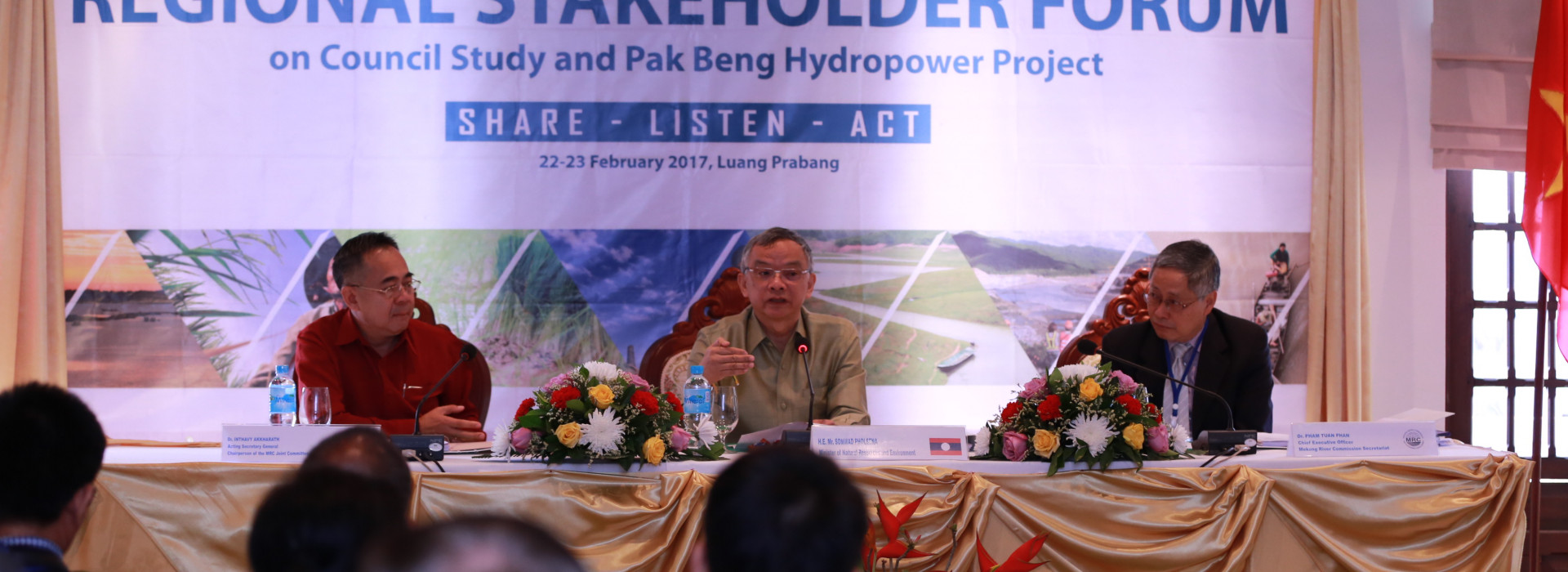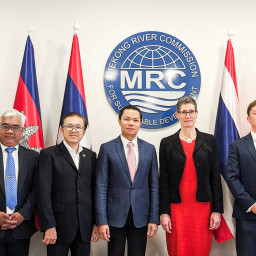Share, listen and act for sustainable development of the Mekong river
On 22 and 23 February 2017, more than 180 representatives from different interest groups gathered at the Mekong River Commission (MRC) Regional Stakeholder Forum to discuss progress and provide views on two important works: the Study on the Sustainable Development and Management of the Mekong River including impacts by mainstream hydropower projects, or Council Study, and the proposed Pak Beng Hydropower Project. Lao Minister of Natural Resources and Environment Sommad Pholsena and Mekong River Commission CEO Pham Tuan Phan delivered keynote speeches at the Forum. Participants included MRC member country governments, development partners, NGOs, research institutes, media, and private developers of the proposed Pak Beng Project and the Xayaburi Hydropower Project.
With the theme of SHARE-LISTEN-ACT, the Forum was an opportunity for MRC to share information on the progress and expected outputs of the two key activities. The forum was opened to all interested parties where views were shared openly and constructively. For the Council Study, participants jointly reviewed and provided recommendations on the design of the Study assessment method, tools and indicators. The Forum also provided a platform for Lao PRD to share what they plan to do with Pak Beng hydropower project and for participants from different stakeholder groups to document views and what needs to be considered in the prior consultation process to avoid, minimize and mitigate the negative impacts, especially the ones of transboundary nature.
During six-month prior consultation process of Pak Beng hydropower project, there would be two Regional Stakeholder Forums, one in Luang Prabang this February and the other one will be organized in May 2017. In addition to the two forums, there have been several meetings and consultations at both, national and regional levels, to provide opportunities for all stakeholders to receive the most up-to-date information, share views and discuss about further actions. Stakeholders’ input, views and comments will be reflected in a stakeholder consultations report that will be considered during the evaluation of the project. Findings and recommendations from regional information sharing report together with national information sharing report will be presented to the MRC governance bodies for consideration during negotiation on conditions for the project. In addition to the meeting, a field visit to Pak Beng in May 2017 will be organized to investigate the site in order to have firsthand experience and understanding of the project site.
The Council Study, on the other hand, is a comprehensive study of not only of impacts of mainstream hydropower projects but also the effects of climate change, floods, and drought and other infrastructure development projects such as water diversion, navigation and sand mining. It helps further enhance the ability of the MRC to advise Member Countries on the positive and negative impacts of water resources development in the Basin.
At the opening remark, Minister Sommad Pholsena said: “We expect the Council Study will provide objective, non-biased and balanced assessment, taking into account past, present and future development, both positive and potentially negative impacts, and offer recommendations for the Council in a way that achieve reasonable and equitable development for all riparian countries.” He continued: “For the Pak Beng project, taking into account the good lessons learned, we will strive for effective and meaningful consultation. With your understanding, support and good recommendations, we expect to reach conclusion on this project.”
“We are trying our best to support the Mekong countries meeting the needs for country development but balancing interests and needs in ensuring the sustainable development and management of the Mekong basin.” CEO Pham Tuan Phan shared. “The MRC is committed to stakeholder engagement as a continuous and step by step process. We want to share with you what we know and have. We want to listen to you. Better yet, we want to work with you in forming partnerships. We welcome comments and feedbacks, at any time, from all interested stakeholders through our active comment box on the MRC website, and we encourage you to come to the next forum.”
According to the feedback received from the stakeholders at the forum and after, there have been improvements in the process of engagement especially the sharing information, the frank and open exchange, the document of comments, and the opportunity for further engagement and inputs. The Forum report will be posted on the MRC website.
-END-
Note to editors:
The Mekong River Commissionis the intergovernmental body responsible for cooperation on the sustainable management of the Mekong Basin whose members include Cambodia, Lao PDR, Thailand and Viet Nam. It serves as a regional platform for water diplomacy as well as a knowledge hub of water resources management for the sustainable development of the region. It is not a supra-national or regulatory body. The commission looks across all sectors including sustaining fisheries, identifying opportunities for agriculture, maintaining the freedom of navigation, flood management and preserving important ecosystems. Superimposed on these are the future effects of more extreme floods, prolonged drought and sea level rise associated with climate change.
The Pak Beng Hydropower Project is a run-of river project located in the Mekong mainstream. The power plant is planned to have an installed capacity of 912 MW, designed to discharge the flow of 5,771.2 cubic meters per second.
The Lao National Mekong Committee Secretariat submitted on 4 November the detailed description of the planned project to the MRC Secretariat for its review and further action to inform the other member countries about the project’s scope and other requirements under the prior consultation process.
The prior consultation is part of the MRC’s procedural rules on cooperation on water use of the Mekong mainstream: the Procedures for Notification, Prior Consultation and Agreement (PNPCA). Under the procedures, any infrastructural project using the mainstream water during the dry season within the same basin, as well as during the wet season between two basins, must undergo the prior consultation process. Applicable projects include large-scale irrigation and hydropower development which may cause significant impacts on the environment, water flow and quality of the Mekong mainstream.
In the prior-consultation process, with technical and administrative support from the MRC Secretariat, the notified member countries would review technical aspects of the project, assess any possible impact on the environment and livelihoods along the riparian communities, and suggest measures to address those concerns. The member countries aim to come to an agreement on how the consulted case should proceed. It is not meant to approve or not to approve the proposed project. This process normally lasts six months, but could be extended further by the JC.
The MRC so far experienced two prior consultation cases – Xayaburi and Don Sahong hydropower projects, both of which are in the Mekong mainstream in Lao PDR. In the two cases, neither of them reached an agreement at the JC level and were referred to the MRC Council, the organization’s highest body with the ministers from the four countries. The Council was also unable to reach a unanimous conclusion on the cases.
For Xayaburi, however, the process has prompted the Lao government and the developer to conduct its own environmental impact assessment and to invest additional $400 million to revise its dam’s design to address the issues of fish migration and sediment, two of the main concerns raised during the prior consultation.
The MRC Member Countries’ Prime Ministers agreed at the 3rd Mekong-Japan Summit in Bali, Indonesia, in November 2011, to conduct a study on sustainable management and development of the Mekong River including impacts by mainstream hydropower projects. On 8 December 2011, the MRC Council, composed of representative ministers from MRC member countries, agreed to implement the study, thus the name ‘Council Study’.
The Council Study analysis of development in the Mekong Basins includes hydropower, irrigation, agriculture and land use, transportation, domestic and industrial water use, flood protection and includes climate change. The Council Study team then assesses the impact of these developments on environment, peoples’ wellbeing and economy. Council Study is thus an integrated, cross-sectoral, comprehensive and state-of-the-art study supporting sustainable development in the Mekong Basin focusing on the MRC Member Countries – Thailand, Lao PDR, Cambodia and Vietnam.
The overall objective of the Council Study is to further enhance the ability of the MRC to advise Member Countries on the positive and negative impacts of water resources development of the Basin. The Council Study specific objectives are threefold:
i) Further develop/establish a reliable scientific evidence base on the environment, social and economic consequences (positive and negative) of development in the Mekong Basin.
ii) Results of the study are integrated into the Mekong River Commission (MRC) knowledge base and enhance the Basin Development Planning (BDP) process.
iii) Promote capacity building and ensure technology transfer to Member Countries.
The major knowledge gaps on the environmental, social, and economic impacts of major and near and medium term water and related resources uses in the Mekong River Basin will be addressed and the resulting new knowledge documented in a series of impact assessment reports. In addition, recommendations on how to address the impacts, both in terms of generating new opportunities as well as prevention, mitigation or compensation options will be developed.
The Forum documents are available at https://goo.gl/Y9j6ta
-END-





